
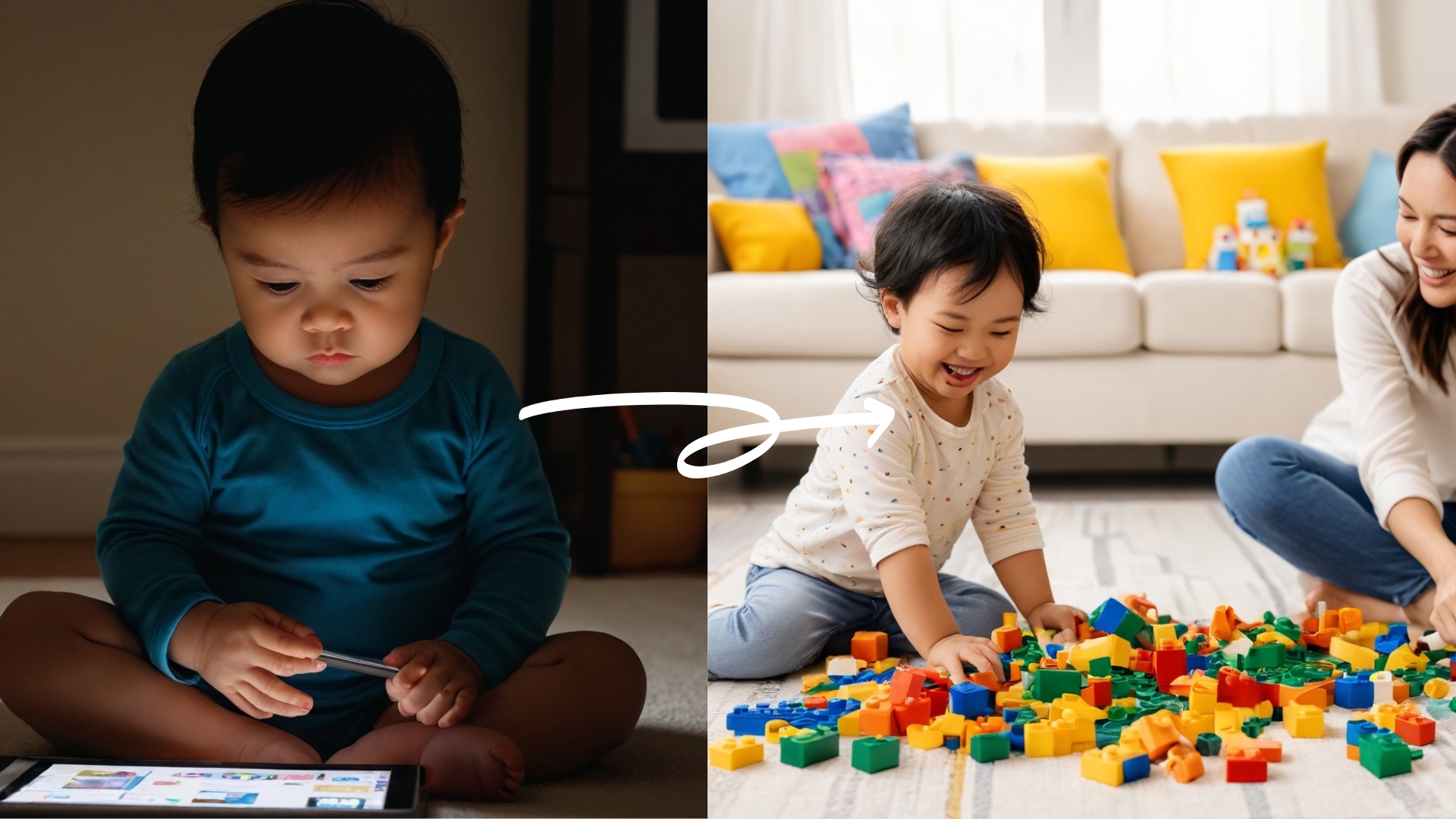
Break The Cycle: How To Build A Truly Connected Relationship With Your Child
How To Create A Deep, Lasting Bond With Your Kids And Actually Enjoy Spending Time Together In Just 90 Days
(Even If Your Own Parents Didn't Model It)

The System That's Transforming Disconnected Families Into Close, Emotionally Secure Units In Just 90 Days
"I don't want that to happen with my child. Even in those that stay in touch, it seems so perfunctory to catch up over a meal and then go on their separate ways."
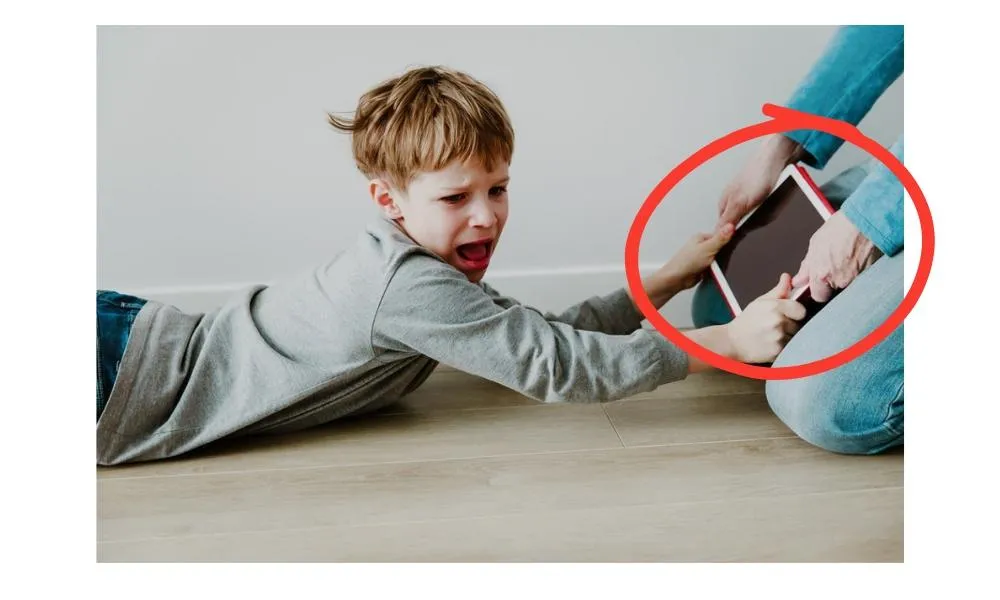
You see it everywhere. Parents and adult children who stay in touch out of obligation. They grab dinner, talk about surface-level stuff, then go their separate ways. There's no real connection. No depth. No genuine desire to spend time together.
And maybe you remember the distance with your own parents—the fear of sharing anything personal because they'd either shut down, go "overdrive on parenting," or make your problems about them. You promised yourself it would be different with your kids.
But here's the thing: your kids adore you right now. They think you're amazing. So how do you keep that going? How do you make sure that when they're teenagers, they still want to talk to you? That when they're adults, they actually like spending time with you?
The truth is, most parents don't know. They wing it. And by the time they realize something's gone wrong, it's too late.
Now Your Daily Struggle Includes:
Feeling like you're failing at the one thing that matters most
Guilt about not knowing "normal"
The perfectionism trap
Hearing your parents' words come out of your mouth
Kids keeping secrets or pulling away
Not knowing where "boundaries" end and "emotional neglect" begins
You Tried Everything The Experts Suggested:
Time-intensive activities and family bonding (but your kid hated it because you had expectations attached, and the whole thing felt forced)
Forcing yourself to listen more (but without actually understanding what you were listening for, or how to stay emotionally present when you're triggered by their behavior)
Reading parenting books (but they all assume you had a healthy baseline to begin with, and they don't address the specific shame and terror of breaking a generational cycle)
Trying to be the "perfect parent" (but perfection made you anxious, rigid, and unable to actually connect because you were too focused on not messing up)
I Hit My Lowest Point When...
I realized I was doing exactly what my parents did—reacting instead of responding, making my child's emotions about me, and having that suffocating, unspoken weight of disappointment hanging over everything.
I felt the panic: This is it. I'm already damaging them. I'm becoming my parents.
And I knew I had to figure this out—not eventually, but now.
Then I Discovered Something That Changed Everything...
I started digging into the actual research on attachment, emotional regulation, and what separates close parent-child relationships from distant ones.
I consumed everything—books on non-violent communication, studies on secure attachment, real conversations with parents who had genuinely close relationships with their adult kids.
But more importantly, I started paying attention to what parents in this exact situation were actually saying about their struggles. Not the Instagram version of parenting. The real, messy, terrified version.
What I learned shocked me:
According to Research On Attachment And Parent-Child Bonding:
The most critical factor isn't what you do—it's whether your child feels emotionally safe with you. This isn't about being their friend. It's about being the person they can tell the hard stuff to without fear of judgment, shame, or their problems becoming about your emotional reaction.
Children with emotionally neglectful parents don't just drift away in adulthood—they develop a core belief that they're not worthy of genuine connection. And when those children become parents themselves, they often repeat the pattern—not out of malice, but because they don't have a template for anything else. The cycle perpetuates itself through generations.
The difference between parents who stay connected to their adult kids and parents who become strangers boils down to three things: trust, consistency, and emotional attunement. Not perfection. Not rules. Not the "right" parenting philosophy. Trust. Consistency. And the ability to tune into what your child is actually feeling—even when their feelings don't make sense to you.
Most parents are unknowingly recreating the exact dynamics they experienced as children. They shut down when their kids get emotional (because their parents did). They make the kid's struggles about their own anxiety or failure (because that's what they experienced). They expect gratitude for basic parenting (because that's what was modeled). They don't realize that "normal" in their family was actually dysfunction.
I know because I was making all these same mistakes...
Through extensive research and consultation with:
Attachment theory researchers and clinical psychologists
Real parents who have successfully rebuilt or maintained close relationships with their adult children
Adult children who are close with their parents despite coming from dysfunctional backgrounds
I discovered WHY traditional approaches fail - and more importantly, what actually works.

I Call It The "Break The Cycle Parent Framework"
By combining attachment theory with practical communication strategies, emotional regulation techniques, and a permission structure for imperfect parenting, I was able to:
Stop automatically repeating my parents' reactive patterns and actually stay present with my kids' emotions
Understand what a healthy parent-child relationship actually looks like—and realize my expectations weren't too high, they were just based on dysfunction
Create a foundation with my young children that I'm confident will carry into their teenage years and adulthood
Learn how to parent with both boundaries AND emotional attunement—without it being a contradiction
Apologize to my kids in a way that actually repairs the relationship instead of confusing them or placing adult burdens on them
Know exactly when to step in and when to let them fail—with a safety net underneath
After helping 200+ parents in this exact situation replicate these results, I've refined this system into a step-by-step method that anyone can use—even if nothing else has worked before.
But Don't Take My Word For It. Listen To These Parents:




The Core Differences Between Parents With Close Adult Children And Parents With Distant Relationships
The 5 Essential Skills Every Parent Who Wants A Lifetime Connection Needs (That Emotionally Neglectful Upbringings Don't Teach)

Consistent Follow-Through:
Doing what you say you'll do, showing up when you promise, and making your word mean something. This isn't about never messing up—it's about being reliable enough that your child trusts you. So many of us grew up with parents who were inconsistently present or whose promises didn't mean anything. Your kids are watching to see if you're different. (Without this, kids develop anxiety and a fundamental belief that adults can't be trusted.)

Non-Defensive Listening: Hearing what your child is telling you without immediately explaining, defending, or trying to fix it. This is devastatingly hard if your parents made everything about themselves or punished you for expressing needs. Your instinct might be to explain why you're not the bad guy or why their feelings are unreasonable. But your child doesn't need that—they need to feel heard. (Without this, kids learn to hide their real thoughts and feelings from you. This is the #1 predictor of parent-child disconnection in adulthood.)

Emotional Attunement: The ability to recognize and validate your child's emotions without needing them to feel differently, make sense, or serve your needs. This is the opposite of what most of us experienced—our emotions were either ignored, criticized, or made about our parents' reactions. Your kids need to know their feelings matter to you, even when those feelings are inconvenient. (Without this, kids learn that their inner world is not safe to share—and they start keeping secrets from you.)

Willingness To Apologize And Repair:
Saying "I messed up" and actually meaning it. Not explaining why you were justified. Not turning it into a teaching moment about how they caused your reaction. Just genuine repair. This is radical if you grew up with parents who never admitted mistakes. But it's the most powerful way to build unshakeable trust. (Without this, kids either accept that relationships are damaged when conflict happens, or they learn to never acknowledge problems—they just pretend everything is fine.)
INSTANT ACCESS - START TODAY
Here's everything you get with The Break The Cycle Parent Framework today
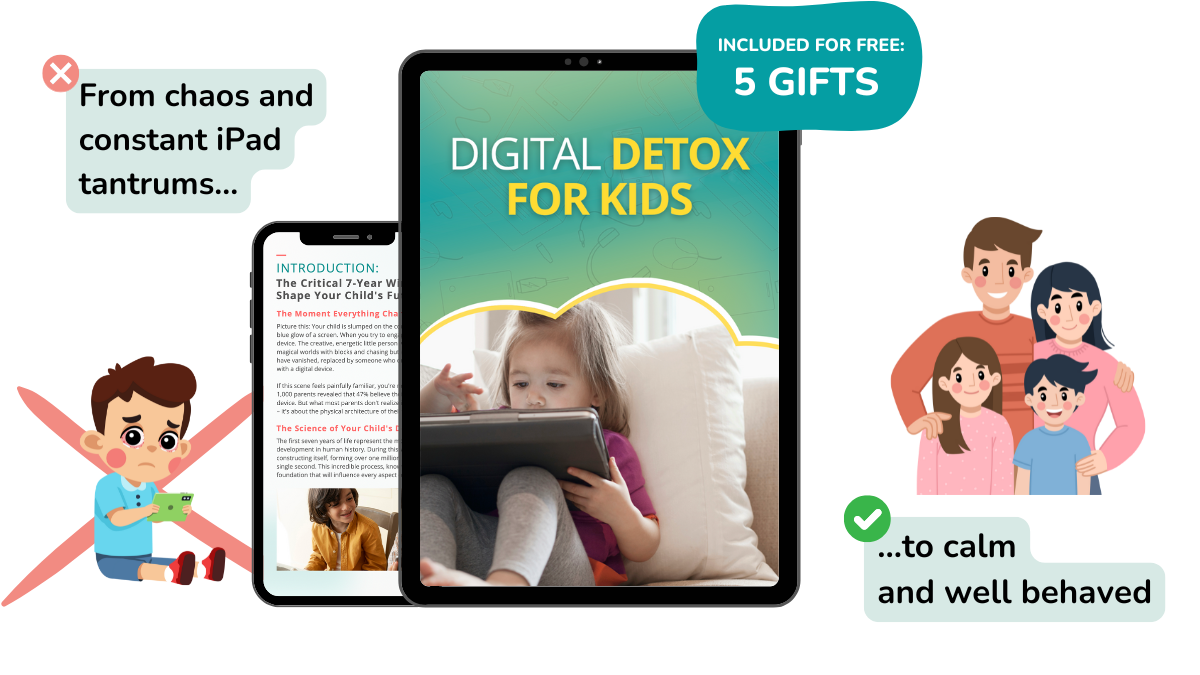
What's included:
The Complete Break The Cycle Parent Framework: 100+ Pages Of Proven Strategies
🎁 Plus These 5 Additional Bonuses 🎁
"The Emergency Repair Guide"- A 20 page PDF you can reference in the moment. Your child is shutting down. You just reacted the way your parents reacted. You said something you regret. This guide gives you the exact steps to repair the damage before it becomes a pattern.
"Identifying Your Triggers" - A 15 page workbook that helps you map out exactly which situations activate your old defensive patterns. You'll discover which of your child's behaviours remind you of your own childhood, and how to separate your past from their present—before you react.
"The Conversation Toolkit" - Real-word scripts and frameworks for 12 of the most challenging conversations parents in this situation face. How to talk about feelings. How to set boundaries without shame. How to listen without fixing. How to apologize.
"Breaking The Cycle In Your Teenage Years" - A 25 page deep-dive into the critical window (ages 9-17) where everything either solidifies or falls apart. The specific strategies that keep teenagers connected to their parents instead of pulling away into secrecy and lies.
"Building Your Support System" - A 12 page guide to finding (or creating) community with other parents who are also breaking cycles. Includes red flags for unhelpful parenting communities and markers of genuinely supportive groups.
Normally: $240 worth of content
Today: Included with your purchase
BEFORE AND AFTER
The Transformation You Can Expect
Don't let your childhood continue dominating your parenting. Your deeply connected, emotionally secure family can be more real than ever—you just need the right system to make it happen.
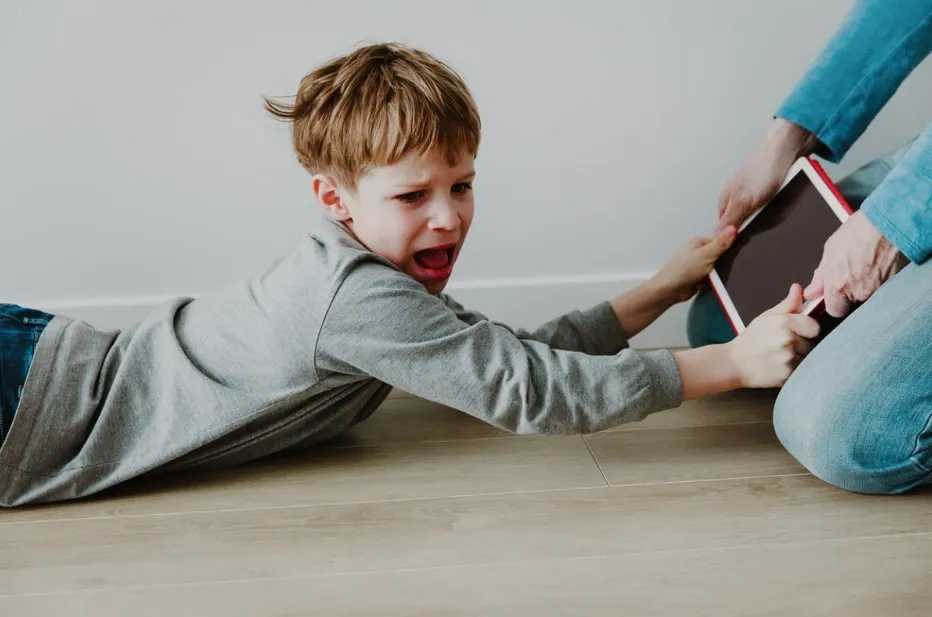
Before The Break
The Cycle Parent Framework:
Constant fear that you're damaging your kids the same way you were damaged
Feeling like you don't know what "normal" looks like, so you can't tell if you're doing anything right
Walking on eggshells around your own kids' emotions because you're terrified of your reaction
Kids starting to pull away or keep secrets because they don't feel safe opening up to you
Guilt about not having a "perfect" parenting strategy, combined with terror that your imperfection is causing harm
Swearing you'd never say or do the things your parents did—then doing them anyway and feeling like a failure

After The Break The Cycle Parent Framework:
Genuine confidence that you're building something different—something secure and connected
A clear understanding of what healthy looks like, and the ability to see yourself making progress toward it
Staying emotionally present with your kids' feelings without it triggering your own wounds
Kids seeking you out when something's wrong, because they know you'll listen without judgment
Permission to be an imperfect parent who's still building a deeply connected relationship
The tools to repair things quickly when you do mess up—and the knowledge that this actually strengthens your relationship
Your Connection-Building Path Begins Here
The 5 Core Components That Transform Your Family From Disconnected To Deeply Bonded:
Each component is precisely designed to rewire your nervous system and build new relational patterns through research-backed techniques and practical implementation.
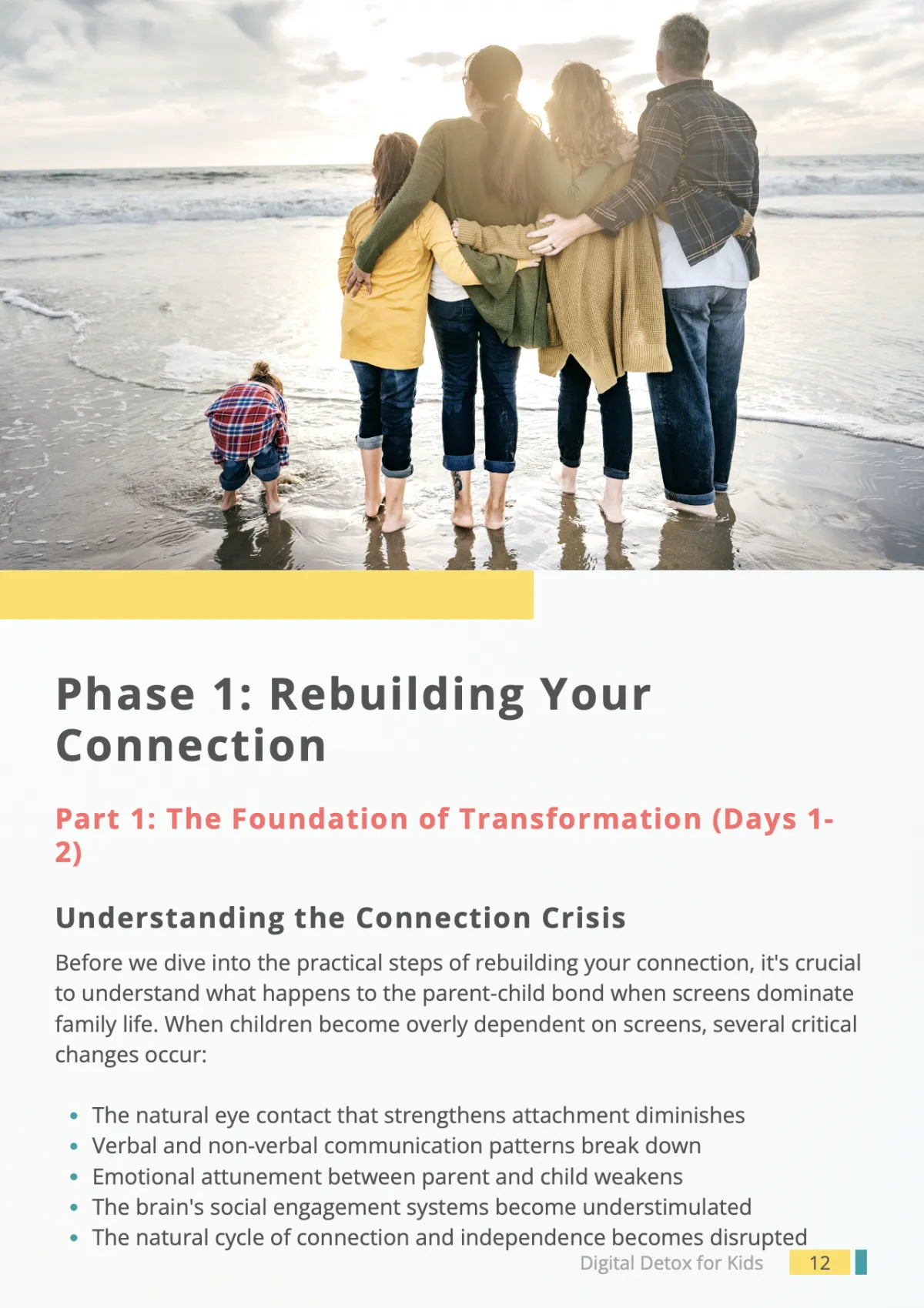
Component 1: Understanding Your Baseline (Week 1)
Recognize exactly how your childhood is showing up in your parenting—this awareness is everything. Our mapping exercise helps you see the patterns you're unconsciously repeating while releasing the shame about having to start here.
The Family Patterns Audit that shows you exactly which of your parents' behaviors you're recreating (and which you're overcompensating against)
The Nervous System Reset that helps you understand why you react the way you do when your child triggers old wounds
The Permission Structure that gives you explicit freedom to be imperfect while building something secure
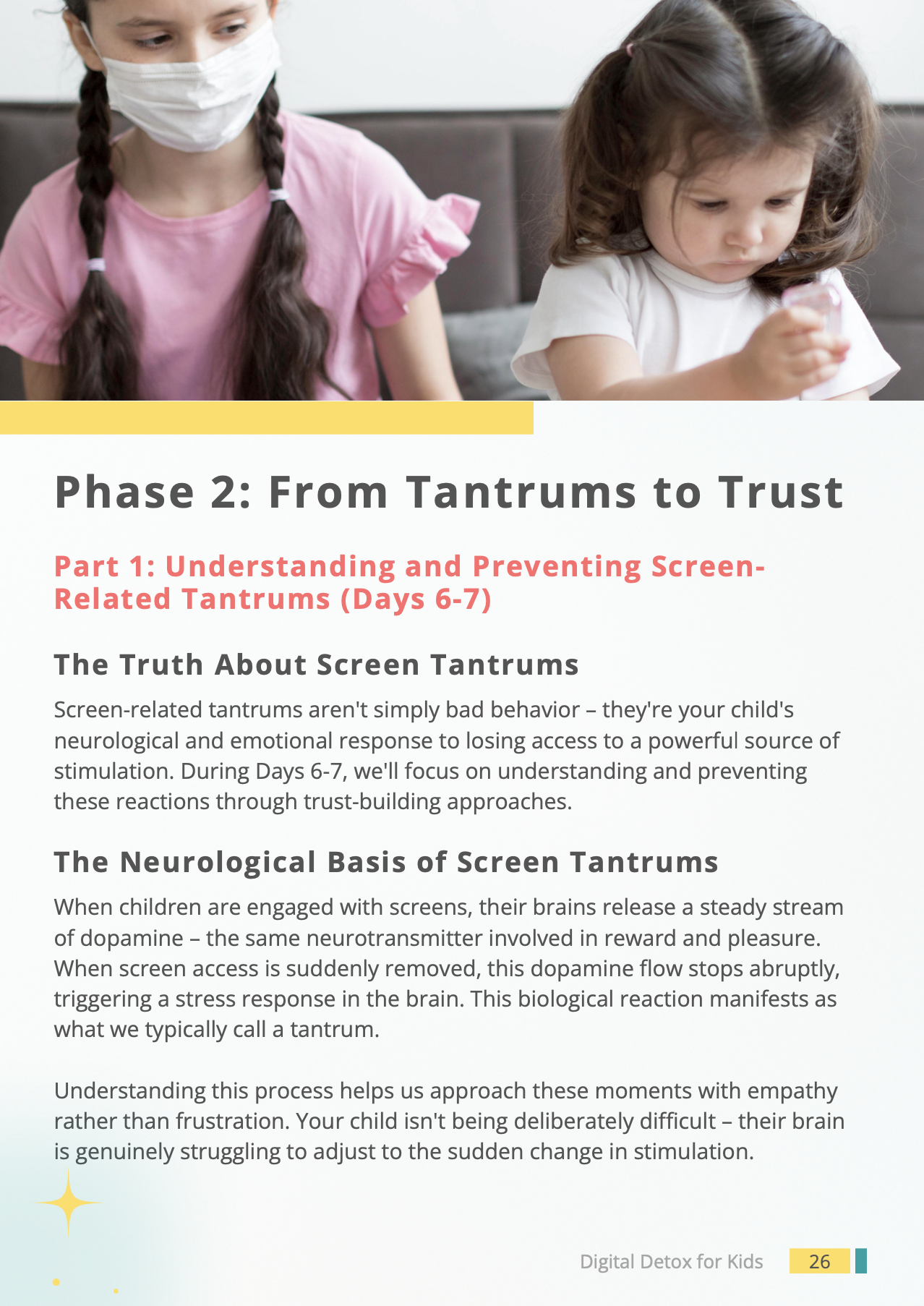
Component 2: The Five Essential Skills Breakdown (Weeks 2-3)
Learn each skill in isolation before integrating them—this prevents overwhelm and lets you master one at a time. Our step-by-step approach takes you from understanding to embodiment.
Emotional Attunement 101 that teaches you how to validate feelings without judgment
The Listening Framework that shows you exactly what to do (and not do) when your child opens up
The Apology Formula that repairs damage and actually strengthens your relationship (instead of confusing your kids or placing burden on them)
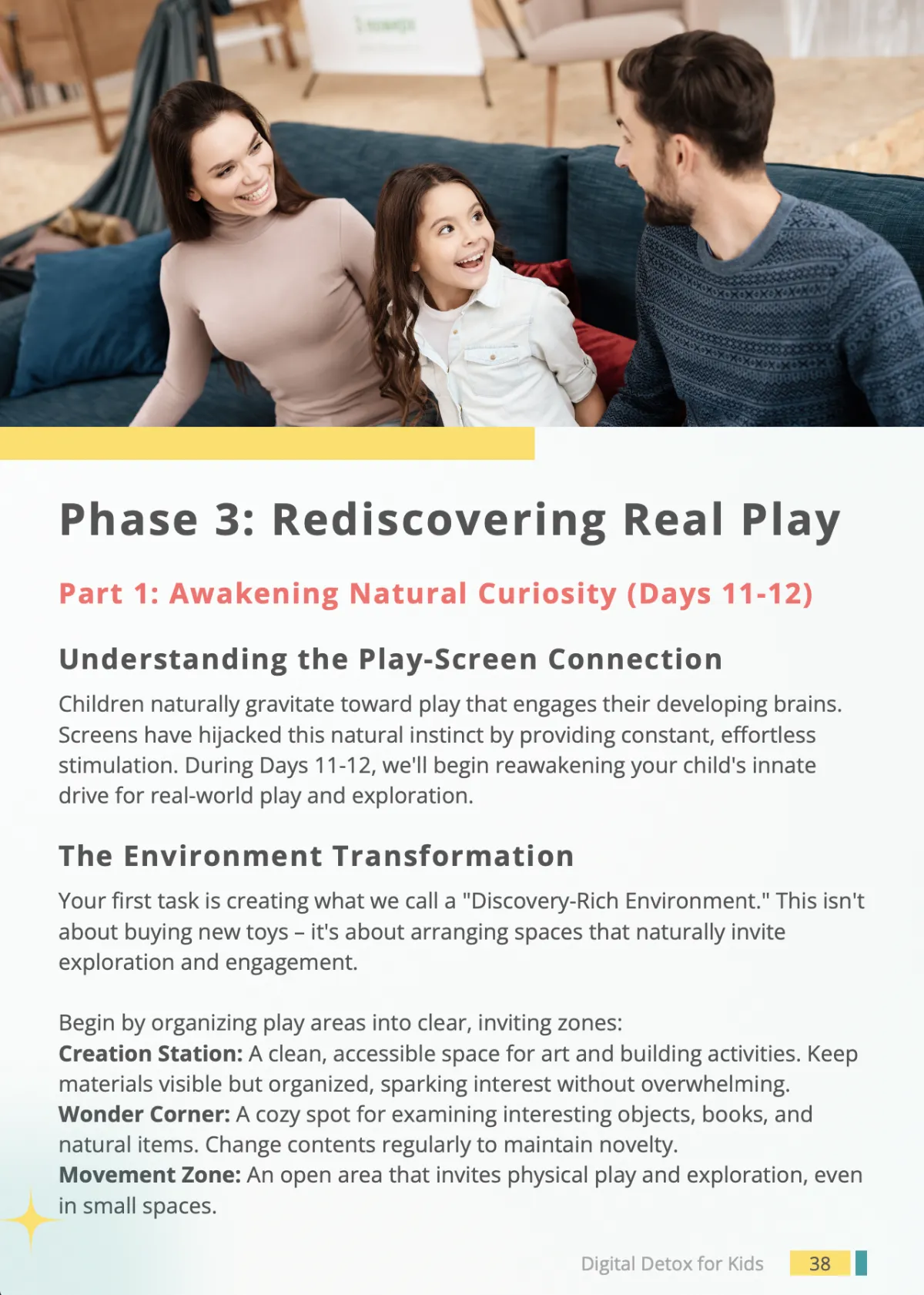
Component 3: Communication Remapping (Weeks 4-5)
Replace reactive patterns with intentional responses using real conversations you'll actually have. This section gives you the language to stay connected even during conflict.
The Conversation Toolkit with 12 scripts for the hardest moments parents face
The Boundary-Setting Framework that maintains structure without coldness or shame
The Emotional Regulation Protocol that keeps you grounded when your child's behavior would normally trigger your default parent
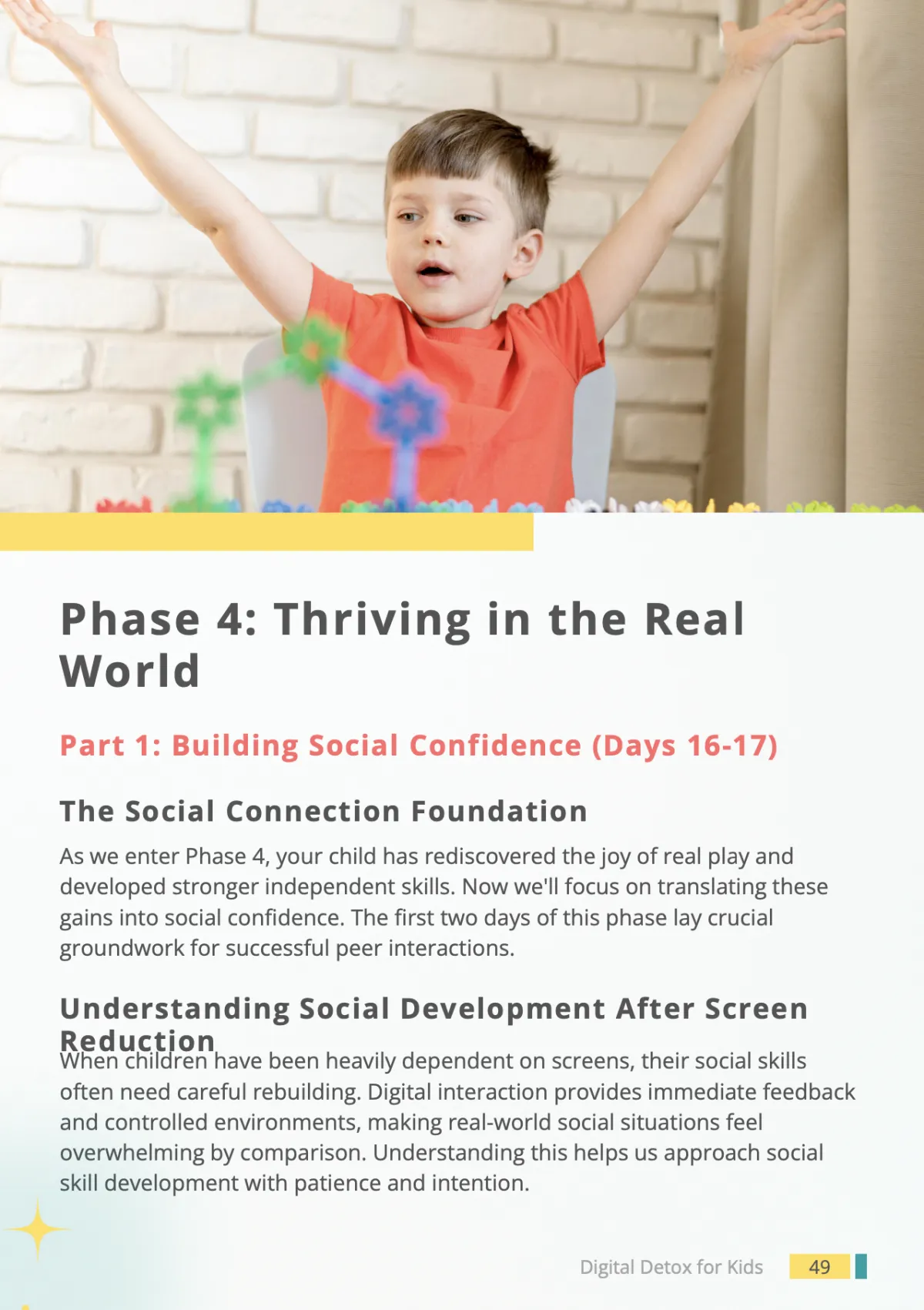
Component 4: Age-Specific Implementation (Weeks 6-7)
What works with a 4-year-old doesn't work with a 14-year-old. This section breaks down exactly how to apply these principles at every developmental stage, with specific examples and adjustments.
The Toddler/Preschool Blueprint that builds foundation attachment while respecting their developing needs
The School-Age Strategies that deepen connection as their world expands
The Teenage Navigation Guide that maintains closeness during the critical years when kids naturally pull away
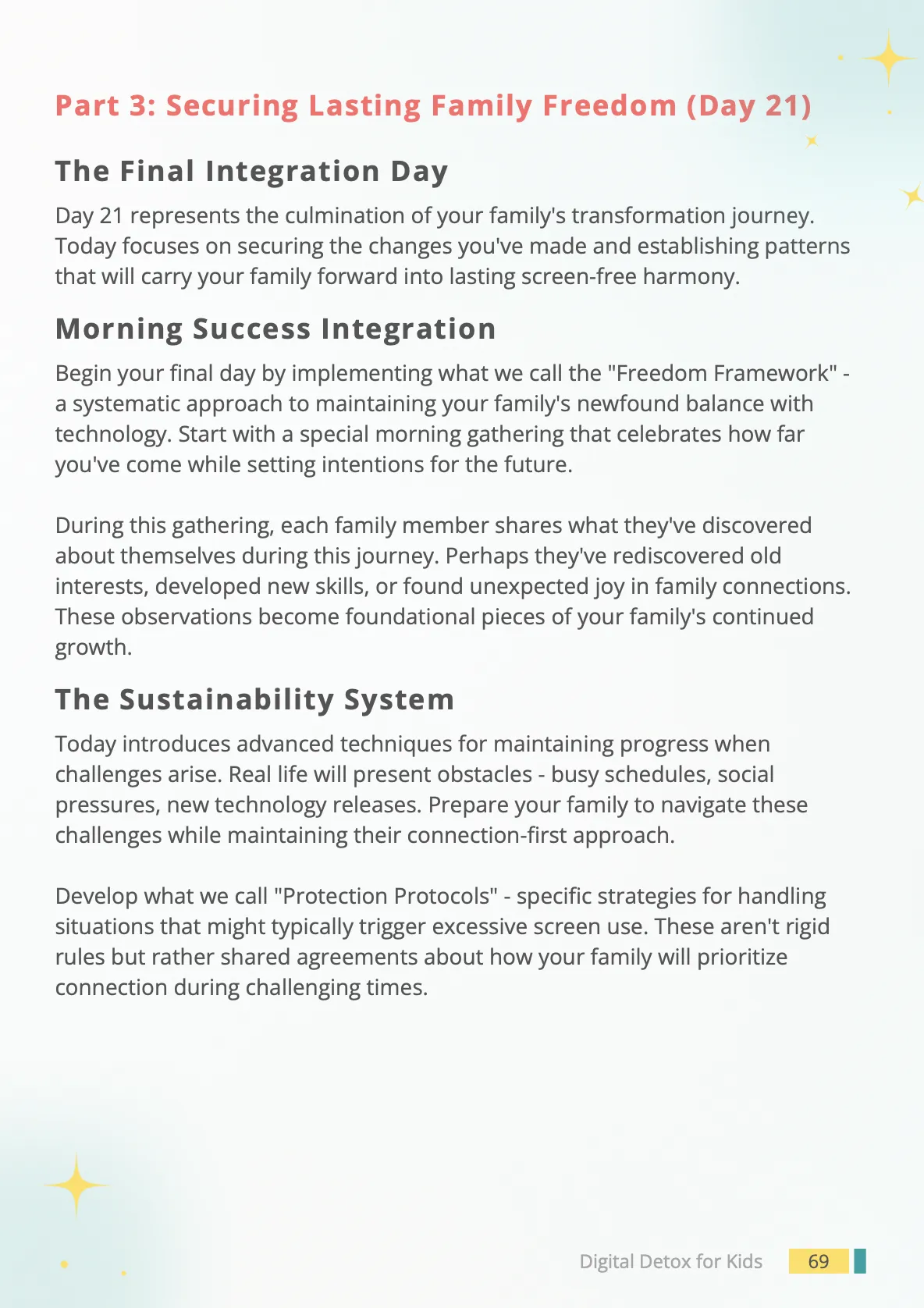
Component 5: The Long Game—Staying Connected Into Adulthood (Week 8+)
These aren't just strategies for keeping kids compliant. This is how you build relationships with your adult children where they actually want to spend time with you. Real connection that lasts.
The Teen-to-Adult Transition that maintains closeness as they gain independence
The Maintenance Framework for staying connected as they launch into their own lives
The Crisis Response Protocol that ensures they come to you when things go wrong—even as adults
